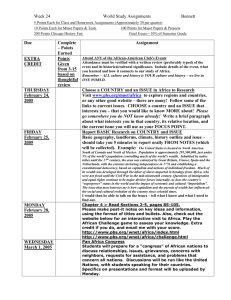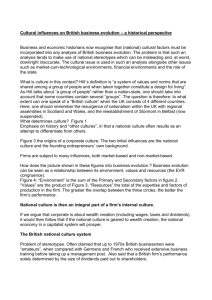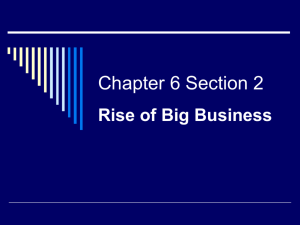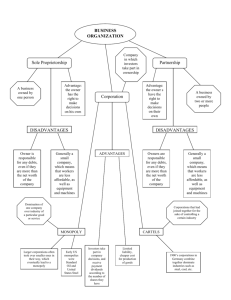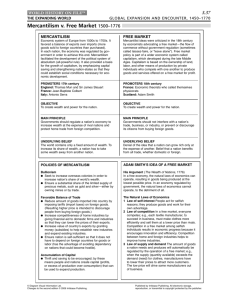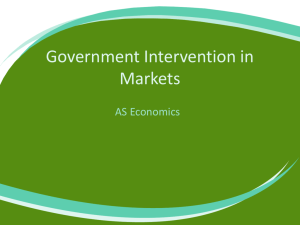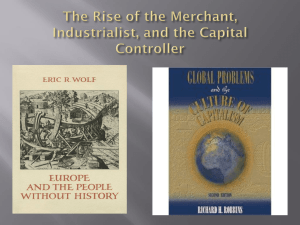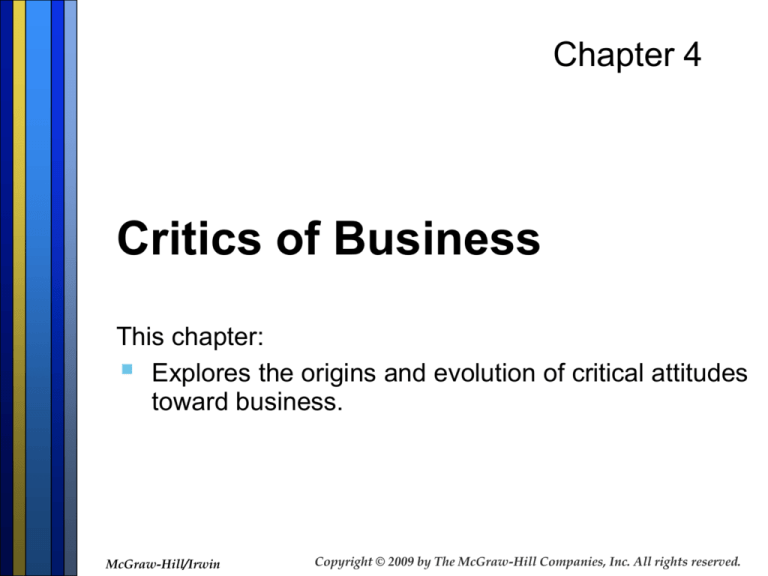
Chapter 4
Critics of Business
This chapter:
Explores the origins and evolution of critical attitudes
toward business.
McGraw-Hill/Irwin
Copyright © 2009 by The McGraw-Hill Companies, Inc. All rights reserved.
Mary “Mother” Jones
Opening Case
Suffered through the death of her family from
yellow fever, and the death of her business from
the Great Chicago Fire.
Rose to prominence as an organizer for the
United Mine Workers.
Fell out with the United Mine Workers and
became a lecturer for the Socialist Party.
In 1905 helped launch the International Workers
of the World.
Eventually became disillusioned with unions, but
continued to speak out.
We may forget Mother Jones, but we hear her in today’s
business critics.
4-3
Origins of Critical Attitudes
Toward Business
Two underlying sources of criticism
of business:
The belief that people in business place
profit before more worthy values such as
honesty, truth, justice, love, and piety.
The strain placed on societies by
economic development.
4-4
The Greeks and Romans
The civilizations of ancient Greece and Rome were agrarian
societies where most people worked the land for subsistence.
There was a popular belief that the amount of wealth was
fixed.
Philosophers reasoned that profit seeking was an inferior
motive and that commercial activity led to excess, corruption,
and misery.
Plato believed that insatiable appetites existed in every
person, but could be controlled by acquiring inner virtues.
Aristotle believed there was a benign form of acquisition
that consisted of getting the things needed for
subsistence.
Epictetus and Marcus Aurelius taught that the truly rich
person possessed inner peace rather than capital or
property.
4-5
The Medieval World
The prevailing theology of the Roman Catholic
Church was intolerant of profit seeking.
Accepted the idea that amount of wealth was
fixed.
According to Church cannon, merchants should
charge a just price for their wares, opposed to our
modern idea of market price.
Catholicism condemned usury.
By the twelfth and thirteenth centuries,
“Commercial activity proved stronger than the fear
of prison or hell.”
4-6
The Modern World
The Protestant ethic – work was a means of
serving God and if a person earned great wealth
through hard work it was a sign of God’s approval.
Capitalism – free markets harnessed greed for the
public good and protected consumers from abuse.
The wealth creation in expanding economies
countered the notion that societal wealth was
fixed.
The industrial revolution created new tensions
that reinforced critical attitudes about business.
4-7
The American Critique of Business:
The Colonial Era
The colonists who landed at Jamestown, Virginia,
in 1606 were sponsored by investors who hoped
to make a fortune by discovering gold in the New
World.
The Pilgrims who came in 1620 were financed by
the Plymouth Company, whose backers sought to
make a profit.
Trade in coastal regions expanded; inland farmers
created a broad agrarian base for the economy.
Benjamin Franklin taught that God would approve
the pursuit of self-interest and wealth.
4-8
The American Critique of Business:
The Young Nation
In the late 1700s the economy was 90
percent agricultural.
Alexander Hamilton believed that industrial
growth would increase national power.
Thomas Jefferson believed than an
agrarian economy of landowning farmers
was the ideal social order.
With the support of business leaders,
Hamilton’s bold actions and ideals
prevailed.
4-9
The American Critique of Business
1800-1865
The first half of the century saw steady
industrial growth.
Many rejected capitalism and tried to
create alternative worlds.
New Harmony
The Oneida Community
The agrarian and socialist communes
failed in practice because they were based
on romantic thinking, not on sustaining
social forces.
4-10
Populists
A farmers’ protest movement that began in the
1870s and lasted through the 1890s led to
formation of the Populist Party.
The populists:
Advocated government ownership of railroad, telegraph,
and telephone companies and banks.
Demanded direct election of U.S. senators.
Sought to abandon the gold standard and expand the
money supply.
Succeeded in electing many state and local officials, but
ultimately failed to forge an effective political coalition.
Refined the logic and lexicon for attacking business.
4-11
Progressives
Lasted from about 1900 until the end of World
War I in 1918.
Mainstream political doctrine.
Sought to cure social ills by using government to
control perceived abuses of big business.
Progressives:
Used the courts to break up trusts and monopolies
Outlawed campaign contributions by corporations
Restricted child labor
Passed a corporate income tax
Regulated food and drug companies and public utilities
4-12
Socialists
The originator of the modern socialist doctrine is
Francois-Noël Babeuf (1764-97)
Advocated seizing the possessions of the
wealthy and giving them to the masses.
Pushed for a violent overthrow of the French
regime, but was imprisoned and then beheaded.
1848 – Karl Marx and Friedrich Engels published
The Communist Manifesto.
Argued that the basis for socialism was an
inevitable process of class struggle underlying
and explaining the history of human society.
Under capitalism the working class is exploited.
4-13
Socialists (continued)
Marx and Engels envisioned an
equalitarian society that abolished private
ownership of capital and instituted wealth
sharing among all members.
Discovered historical theory that class
warfare was the underlying dynamic that
changed society.
“WORKING MEN OF ALL COUNTRIES
UNITE!”
4-14
Socialists (continued)
United States of 1850-1900:
Child labor was widespread
Factories injured and wore down workers
Wealth and power were concentrated in great
banks, trusts, and railway systems
Inequality between rich and poor seemed
obscene
The masses suffered through financial panics
and unemployment
Industrial growth created a new social working
class
4-15
Socialists (continued)
Unionization
Early unions tied to single companies or
locations
1869 - Knights of Labor set up
1886 – American Federation of Labor formed
1877 – beginning of violent union strikes
1905 – Industrial Workers of the World (IWW)
formed
1912 – Peak of socialism in the United States
4-16
The Great Depression and
World War II
There was a period of high confidence in
big business during the 1920s, ending with
the stock market crash of 1929.
As the depression deepened, anger at
business grew.
Huey Long introduced a plan to redistribute
wealth, but was assassinated before it
could be enacted.
The war years washed away the
populist/socialist/depression era image of
the corporation as a bloated plutocracy.
4-17
The Collapse of
Confidence
Strong public support for business
collapsed in the mid-1960s.
Four strong social movements
attacked big business:
Civil rights
Consumer rights
Environmental rights
Vietnam war opposition
4-18
Percentage of American Public
Expressing “Great Confidence” in
Leaders of Major Companies
4-19
The Collapse of Confidence
(continued)
Theoretical “confidence gap” created in the 1960s.
Rising popular distrust of business gave reformers
the support they needed to increase government
regulation dramatically.
By the mid-1970s corporations had organized to
fight.
Early 1980s – “new” progressive movement born.
Corporations have too much power.
Corporations have excessive legal rights.
Corporations are inherently immoral.
4-20
Progressive Left
The progressive left:
Is highly articulated and specialized.
Has a network structure that includes
foundations, research institutes;
publications; mutual funds pension funds;
unions; and groups of environmental,
human rights, and labor advocates.
Together the network structure creates
an organizational symbiosis.
4-21
How the Progressive Network
Attacks a Corporation
4-22
Global Critics
Corporate power increasingly challenges its
antagonists on the world stage as transnational
corporations have grown in size and number.
A reaction to that growth is a substantial increase
in the number of nongovernmental organizations
(NGOs), which now number more than 40,000.
NGOs animate civil society, which is a zone of
ideas, discourse, and action that transcends
national societies and focuses on global issues.
In the 1990s an antiglobalism movement evolved
within civil society.
Antiglobalism is united against neoliberalism.
4-23
Global Critics (continued)
Neoliberalism – a term denoting both the
ideology of using markets to organize
society and a set of policies to free markets
from state intrusion.
Liberalism – the philosophy of an open
society in which government does not
interfere with rights of individuals.
Economic Liberalism – the philosophy that
social progress comes when individuals
freely pursue their self-interests in
unregulated markets.
4-24
Global Activism
Activists attack corporations using a
range of devices:
Consumer boycotts
Shareholder proposals
Harassment
Codes of conduct
Corporate campaign
4-25
Concluding Observations
Each era brings new personalities, new targets,
and some new issues, but the fundamental
language and substance of criticism remains the
same.
Industrial capitalism is a historical force for
continuous, turbulent social change.
Capitalism, for the most part, brings changes that
represent progress, a condition of improvement
for humanity.
A broad spectrum of criticism is an important
check on business power.
4-26


